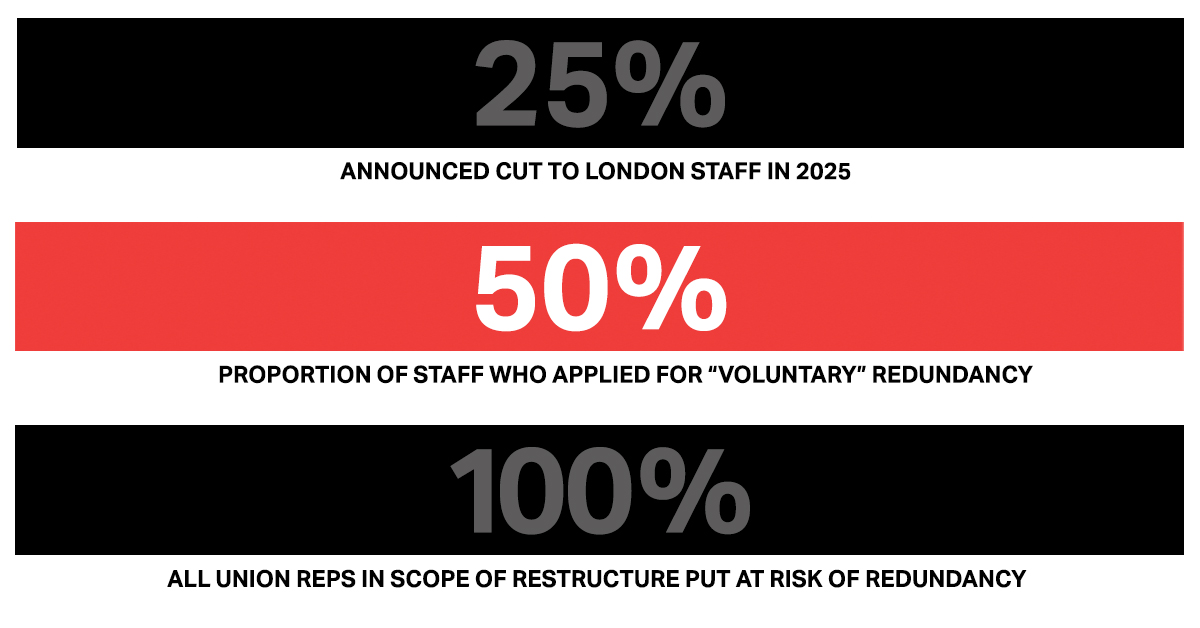And what does the number of applications mean for the future of the organisation?
Staff have voted for industrial action for the first time in the 129-year history of the International Transport Workers’ Federation (ITF). We are fighting for the future of our organisation, armed with the conviction that our work matters.
From brutal cuts to mass “voluntary” departures
ITF management are seeking to cut 25% of staff roles in the London headquarters this year. This severe reduction in staff is the guiding objective of a poorly-planned restructuring process to find £4 million in cost savings.
The uneven cuts being proposed will empty the organisation of critical capacity while magnifying existing inequalities.
ITF regional staff are also facing drastic restructures, starting with those in Asia Pacific in a parallel timeline with London.
Even more worrying is the revelation that 50% of staff in London and Asia Pacific have submitted applications for what management are calling “voluntary redundancy”.
Jump before you are pushed out
If an organisation is looking to reduce headcount responsibly, you would expect a voluntary redundancy process to precede any restructure.
First, make an open offer to staff to see who might be ready to leave the workplace, and then see whether any further savings are required to balance the books.
This logical sequence is what the staff union proposed, in line with past precedent from 2012, which successfully avoided the need for any compulsory redundancies.
Instead, ITF management only opened an organisation-wide “voluntary” redundancy window after sending a large proportion of staff “at risk of redundancy” letters and beginning a formal consultation period on job cuts.
A great deal of uncertainty remains. Staff can withdraw their applications for a limited period of time and may reconsider when a clearer picture of the new structure is finally presented.
Still, it is difficult to describe this decision as “voluntary” for our affected colleagues who have been asked to gamble on their futures.
- Option 1: Choose to stay and contend for a role in the new structure with no guarantees – risking compulsory redundancy.
- Option 2: Resign from the ITF and re-enter a tight job market to receive an enhanced “voluntary” redundancy offer.
Signs staff are being failed by management
Some staff received letters stating that their roles are not at risk, only to subsequently receive letters saying that they are.
A number of our colleagues have not received any formal communications and have been excluded from the consultation process, seemingly due to their contract status.
Following the close of the consultation, an as yet undetermined number of staff are expected to receive assurances that their jobs are no longer at risk.
Nevertheless, this 50% figure – which represents over 75 applications from London and Asia Pacific for “voluntary” redundancy – is a clear sign that all is not well.
A recent survey found that 94.8% of respondents did not feel they had been provided sufficient information to make an informed decision about their future, while 91.8% indicated that the “change process” had negatively affected their mental or physical health.
There is a sense that ITF management started the process with an end goal in mind, but had not done their due diligence to properly plan the complicated logistics of an organisation-wide restructure.
This context cannot be ignored as a contributing factor towards the large number of applications for “voluntary” redundancy.
The leadership of any organisation should be worried if 50% of its staff would consider leaving rather than remain in their current environment.
What does this say about the culture of our workplace, the degree to which people feel valued, and their expectations for the future?
Tragic loss of organisational capacity
While we are saddened by this news, we support our colleagues who have had to make these difficult choices.
Some may be ready to move on. Many others would prefer to stay, but can’t afford to take the risk and see little prospect of holding onto their employment.
We know that each individual has to make the decision that is best for themselves and their families.
But make no mistake: this is a tragedy on a collective scale.
Hundreds of years in combined experience will disappear. This is a tremendous loss of institutional memory, specialised skills, and relationships with ITF-affiliated unions that dedicated staff members have cultivated over their working lives.
After approving an ambitious plan at the ITF Congress in Marrakesh in October 2024, that vision is being jeopardised.
Staff have been left feeling they are disposable. There is a widespread lack of understanding about the work we do.
During consultations, teams flagged the various ways in which cuts would make it impossible to produce what was committed to in Marrakesh. Management appeared neither particularly surprised nor concerned about this information.
At a critical historical moment, the signal being broadcast from the ITF to our fellow trade unionists and to the wider world is that we are retrenching rather than advancing.
Solidarity is the way forward
We are all committed trade unionists. As much as we are concerned about the risks to our livelihoods, we are also deeply concerned about the future of the organisation.
We know that our work matters: we’ve been asked to do it by you, the ITF’s affiliated unions. Congress approved a bold plan, not severe cuts.
We remain hopeful that we can reach a resolution that upholds trade union values of fairness and equality.
For us as staff that means:
- Avoiding any compulsory redundancies
- Upholding our commitment to create a more equal workplace
- Recognising the sanctity of our Collective Bargaining Agreement
- Respecting the rights of regional staff under the ITF Constitution
- Ensuring responsible stewardship of financial resources
- And protecting the essential work of our organisation
We need your support to make this fair resolution a reality.

Leave a Reply